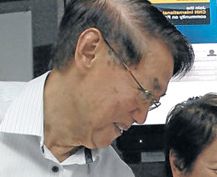LUCENA CITY — The head negotiator of the National Democratic Front of the Philippines (NDFP) has said they would rather wait for the next Philippine president to take power before returning to the negotiating table for peace.
“If the Aquino government continues to refuse, then the NDFP continues with revolutionary struggles throughout the country and is willing to wait out the three years left of the Aquino regime,” Luis Jalandoni, NDFP chief peace negotiator, said in a video interview done by ‘Liberation International’, the NDFP official news organ.
He added: “The possibility of any change (in the government leadership) is there and with any change, the NDFP is open to the peace negotiations going on.”
The NDFP is the political arm of the Communist Party of the Philippines. Its armed wing, the New People’s Army (NPA), has been waging war against the government for the past 44 years, considered as the world’s longest-running communist rebellion.
A copy of the interview was sent to the Philippine Daily Inquirer on Wednesday, June 12. The video is also posted on the NDFP website.
Jalandoni, who is currently based in Utrecht, The Netherlands, said the prospects for peace negotiations under the Aquino administration have dimmed “because of the rhetoric of the Philippine government stating that they are ending the peace negotiations and putting the blame on the NDFP.”
Early last month, the government peace panel announced the termination of the peace negotiation and put the blame on the NDFP with its preconditions and demands.
Teresita Deles, the presidential peace adviser, had said the government would use a new approach in pursuing discussions and many took that to mean that the government would seek peace talks with local chapters of the communist rebellion through “localized peace talks.”
The NDFP denied government claims that the negotiations had reached a dead end and claimed they were not properly notified of the termination as stipulated in the Joint Agreement on Safety and Immunity Guarantees (Jasig) signed by the two sides in 1995.
The communist leaders also assailed the resurrection of the “localized peace talks,” stressing the NDFP has remained the only authority to conduct peace negotiation in behalf of the insurgents.
Malacañang insisted the NDFP has been informed and notified of the termination of the talks.
In the video interview, Jaladoni said the NDFP was “open to meaningful peace negotiations that address the roots of the armed conflict and respect bilateral agreements that have been signed.”
“Unfortunately, recently, the Aquino [administration] has embarked on a vitriolic attack on the NDFP claiming that the NDFP is scuttling the peace talks by imposing preconditions,” Jalandoni said.
During the 18-minute interview, Jalandoni spoke about the root causes of the armed conflict. He also enumerated how the two parties signed 10 bilateral agreements since the start of the peace talks in 1987.
Asked by the interviewer on when would the armed conflict end, Jalandoni said the Hague Joint Declaration signed by both parties in 1992 provided that the cessation of hostilities and the disposition of the forces could only be pursued if agreements on social and economic reforms and political and constitutional reforms were formulated.
“We believed this is important and wise agreement signed by both sides so as to make sure that the basic reforms which are addressing the roots of the armed conflict like problems of land reform and national industrialization would first be negotiated and implemented before coming to ending the hostilities,” the NDFP leader asserted.
Jalandoni accused the Aquino administration of using “Oplan Bayanihan” to quell the insurgency. He described the military plan as a “US designated counter-insurgency program that is a militarist approach and denies addressing the roots of the armed conflict”.
Peace negotiations between the communist rebels and the government have been stalled since 2004, giving rise to continued human rights violations committed by the NPA rebels and state security forces.
